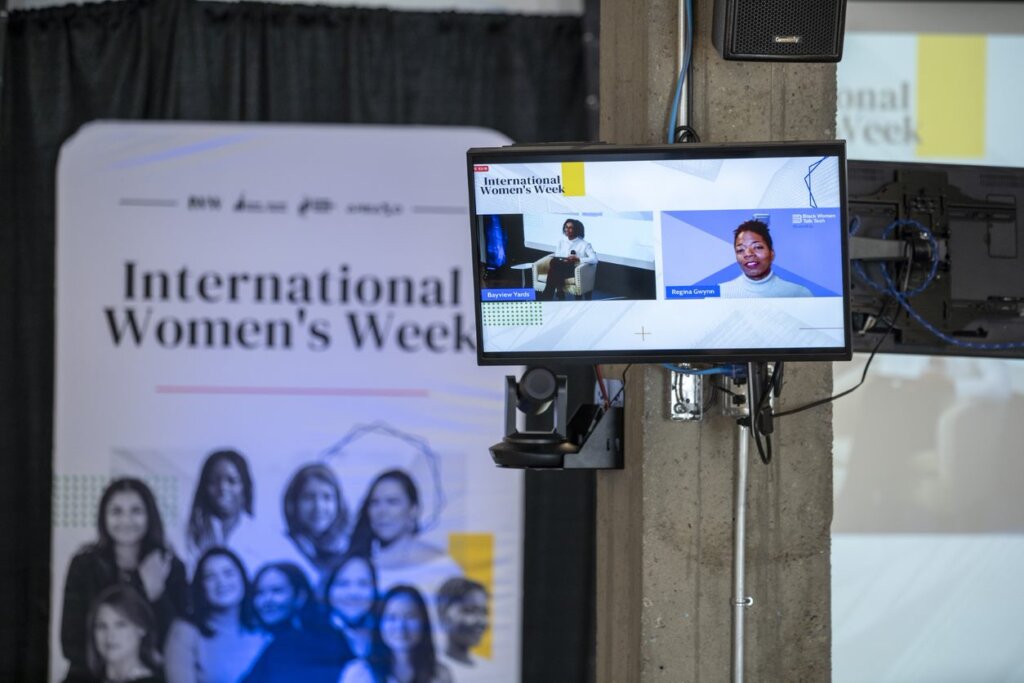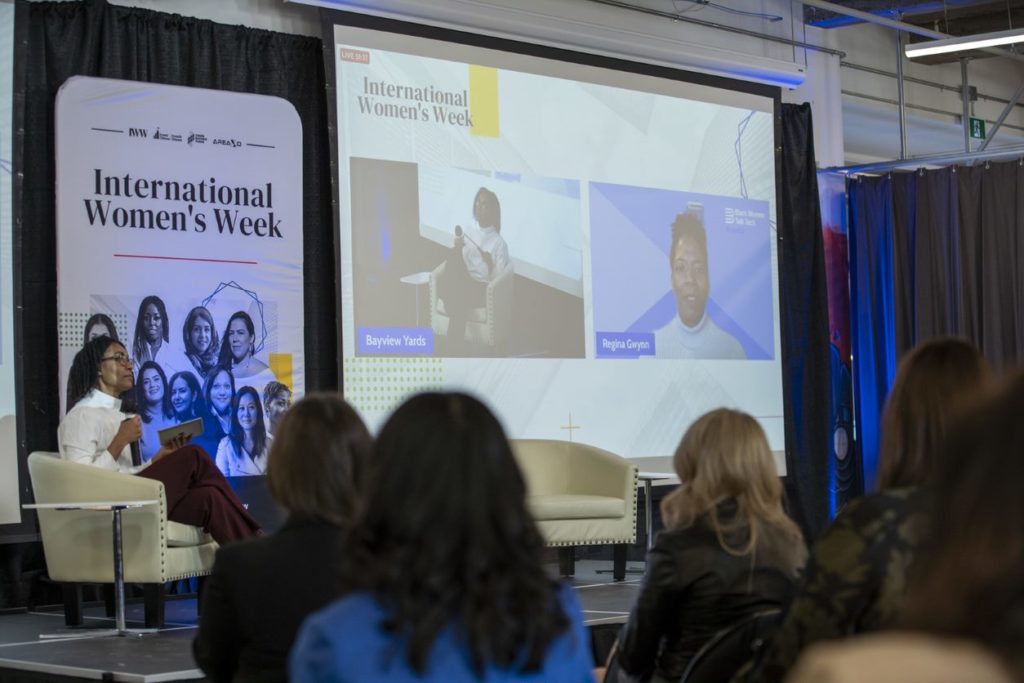Home » When you empower a woman, you empower a community: a fireside chat with Black Women Talk Tech Co-Founder Regina Gwynn
When you empower a woman, you empower a community: a fireside chat with Black Women Talk Tech Co-Founder Regina Gwynn

Mar 2, 2022
 On March 8, the world celebrates International Women’s Day. From February 28 to March 11 (and beyond!) Invest Ottawa hosts the 4th annual International Women’s Week: IWW 2022.
On March 8, the world celebrates International Women’s Day. From February 28 to March 11 (and beyond!) Invest Ottawa hosts the 4th annual International Women’s Week: IWW 2022.
And on February 28, we launched our kick-off event of IWW 2022, The ‘F’ Factor: Fueling Women Founders, with fire discussion by changemaking women founders and business leaders from all walks of life to inspire, equip, and empower women in leadership in professional fields.
We had the privilege to celebrate the last day of Black History Month with award-winning serial entrepreneur and co-founder of Black Women Talk Tech, Regina Gwynn, moderated by co-host at CTV Morning Live Rosey Edeh.
We sat down with both Rosey and Regina to explore concrete, actionable opportunities to create a more diverse, equitable, and inclusive entrepreneurship ecosystem, where Black women founders and entrepreneurs from every walk of life grow, thrive, and succeed. Providing inspiration and actionable insight, Regina hits us with a real authentic talk on the disproportionate impact and systemic challenges facing women founders, particularly Black women founders, entrepreneurs of colour, and those from marginalized communities.
We had the privilege to learn from a resilient woman leader, taking her learnings in her corporate and early-stage entrepreneur days to then applying the lessons learned to build a strong ecosystem for entrepreneurs of colour and the next billion-dollar businesses. From addressing unconscious bias when making investment decisions to alternatives in capital raising, there’s a lot to unpack in this fireside chat. And we are here for it!
Regina has been through the entrepreneurial tech trenches and is an accomplished and recognized leader in tech entrepreneurship, industry, and diversity, equity and inclusion. She’s also an advisor, and angel and LP investor, named 100 Most Powerful Women by Entrepreneur Magazine and Top Ten Women in Tech by Essence Magazine.
When you empower a woman, you empower a community.
Rosey: Can you tell us a little bit about your personal story?
Regina: I was blessed to grow up around small business owners and entrepreneurs. I knew I wanted to be a business owner and start something but didn’t know what until I came upon an idea with a former business partner around the beauty experience for women of colour. It prompted us to think about how to use on-demand technologies like Uber and FreshDirect but to be able to push a button and have your stylist come to you. This was where I launched one of the first on-demand, on-location beauty apps for women of colour in 2013 called Tress Noire.
However, I was faced with the challenges of being originally a non-tech founder, trying to find access to the right technical talent, mentors and advisors. So, in 2017, Black Women Talk Tech was created to provide access to building billion-dollar businesses for entrepreneurs of colour.
Rosey: Not knowing much about technology and startups, how often would you say you fell down and had to get back up again?
Regina: I’ve publicly and embarrassedly failed several times. Having been to the Kellogg School of Management at Northwestern University, I thought I had the network, but nope! Entrepreneurship humbles you, and I believe something is to be said about timing and your network. In the U.S., less than 1% of venture funding goes to black and brown founders, and on average, that translates to $42,000 that might go to a black woman in venture funding, as opposed to $1.4 million on average that goes to male counterparts. So with this in mind, there were lots of failures, a lot of wins, but also a lot of learning in terms of what it takes to move the needle to get from $100,000 in revenue to $100B.
Rosey: Why are you so passionate about propelling the growth of black women founders and entrepreneurs from every walk of life?
Regina: When you empower a woman, you empower a community. I’ve seen the power of one founder getting her first investor cheque at Black Women Talk Tech’s first conference in 2017. By the end of the year, she was making a seven-figure revenue and two years later, was raising one of the largest series A rounds for a black woman founder.
That’s impact. And it’s bigger than me. I’m just excited to be a part of it. But, more importantly, I’m excited about building generational wealth for families. There’s something very powerful in creating jobs, opportunities, and sustainable changes for the socio-economic class. I get excited because it’s such an untapped opportunity. But, I also know the struggle, which allows me to navigate and advocate differently than others.
Rosey: Black women are building and growing businesses faster than other segments yet received less than 1% of venture capital funding. What is Black Women Talk Tech doing to change that?
Regina: At Black Women Talk Tech, we focus on education during our summits and conferences, such as finance and fundraising, to provide tools to help apply meaningful changes to one’s business.
We also focus on the storytelling of women who are proving success; we’ve experienced billion-dollar startups. These women need to be seen and their stories shared so others can learn through their experiences.
And lastly, we focus on money. The best way to empower a black woman is to cut her a cheque. Black Women Talk Tech works to put the right investors and shareholders in the room to see opportunities.
Rosey: How did the pandemic affect you?
Regina: It has been such a deep exploration for me. Unfortunately, I lost a lot of people in my family and within my network. It’s a frustrating experience. I was angry and annoyed. I also think about the businesses affected and closed since they didn’t have access to initial funding and instead used customers and revenue to power their businesses.
The pandemic allowed me to stop and assess what was important to me. It also allowed me to spend time doing things that I hadn’t done before, like just being.
Rosey: Within Black Women Talk Tech, what are some of the things that you’ve learned over the 20 months during these challenging times that would give hope for the future of tech entrepreneurs?
Regina: The community itself. Organizations, partners and allies have reached out to recognize that there is a serious problem. Coming out of the pandemic, meaningful conversations have prepared us for so much more opportunity coming into this year. It has allowed us to ask questions like: How do we think about access, resources and capacity building? And specifically, how do we think about technical talent?
You can have a great idea, but it is nothing if your product is not designed well. And this is key to determining what investors will find opportunity in.
Rosey: What do you think is needed to address this investment challenge and put more capital in the hands of Black women founders and other entrepreneurs from every walk of life?
We need to address the uncomfortable conversation around unconscious bias.
Regina: We need to address the uncomfortable conversation around unconscious bias. We need to challenge who we are naturally inclined to have casual conversations and meet with. Those conversations build trust and relationships and ultimately build the pipeline towards landing an investment. Smart investors would do well to get outside of their comfortable pattern recognition network.
Rosey: For founders looking for capital, would it benefit them to learn how to navigate a male-dominated world? Or would it help to reteach unconscious bias?
Regina: To successfully navigate the tech ecosystem, you’re going to have to know the tricks of the trade, you’re going to have to know the jargon, and you’re going to have to understand who the stakeholders are.
You’re going to get ‘nos’ across the board, but knowing your story, numbers, market size and opportunity, traction, and product-market fit sets you up to win. The only thing you can control is your ability to put your business in the best possible light.
Rosey: Outside of venture capital, can you share with us the other ways in which founders can go about obtaining capital?
Regina: Venture capital is not the only money available. I always recommend that all founders and entrepreneurs have good credit. Small business loans are relatively easy to get if you have good credit, and they can give you up to half a million dollars.
Depending on your stage, industry, and type of business you’re running, there are many ways to get money outside of venture, such as equity crowdfunding.
Rosey: What is your leadership style?
Regina: I am not a micromanager. I spend a lot of time recruiting and hiring to find someone I think is capable. If I’m hiring someone, it’s because I expect the hire to feel confident in their ability. I also like to establish trust early on to know a hire can run with particular projects and do it well.
My biggest focus as a leader is to provide a hire with the resources and tools to execute properly.
Rosey: What advice would you give your younger self?
Regina: The best advice I give to every entrepreneur and those thinking about starting a business is to get started and not overthink everything!
Rosey: What is your greatest lesson learned, and how did you apply it?
Regina: Corporate America has taught me to be set up to win. There was a time when I did not believe that my boss or team set me up properly with the right tools or that I understood the projects I was working on. So, painfully learning that lesson has stayed with me for the rest of my career to ensure that my team is set up to win.
Also, knowing your strengths and weaknesses and truly developing those weaknesses by providing areas of development is key.
Audience question: What skills do you believe you acquired were fundamental in helping you get to where you are today?
Regina: Having thick skin is key. You will get a lot of ‘nos.’ Know that the ‘nos’ are not personal.
Being resourceful is also key to being a successful entrepreneur. Someone’s going to tell you it has to be done this particular way, and you’re going to find another way to do it. You need to have a workaround to find a plan B and execute plans C, D, and E by knowing how to use your resources.
Audience question: How have you built such a strong resilience muscle?
Regina: Remembering my ‘why’ is important and remembering that my work has a bigger impact than myself. My journey allows for a level of wisdom and understanding that I am grateful for, which helps me try to be resilient.
Listen to the recorded session of the F-Factor: Fueling Women Founders on our YouTube Channel along with other inspirational IWW 2022 events.
Make the most of IWW 2022 by checking our complete March calendar of IWW 2022 events.
Catch all the actionable insight and inspiration of International Women’s Week! We are excited to come together with collaborators from our region, across Canada and around the world for this empowering month. Dozens of partners are joining us to promote women in leadership, host and contribute to events, and engage participants from Canada’s Capital and anywhere on planet earth.
Invest Ottawa
https://investottawa.ca
Invest Ottawa, is Ottawa’s leading economic development agency for fostering the advancement of the region's globally competitive knowledge-based institutions and industries. Invest Ottawa delivers its economic development services through a unique partnership with the City of Ottawa, where the City and Invest Ottawa, through its members set the strategy and manage the programs that move Ottawa’s economy forward. Invest Ottawa is a non-profit, partnership organization that operates on an annual budget that comes from a variety of sources including: municipal, federal and provincial government; membership fees; professional development programs; and private sector contributions.


